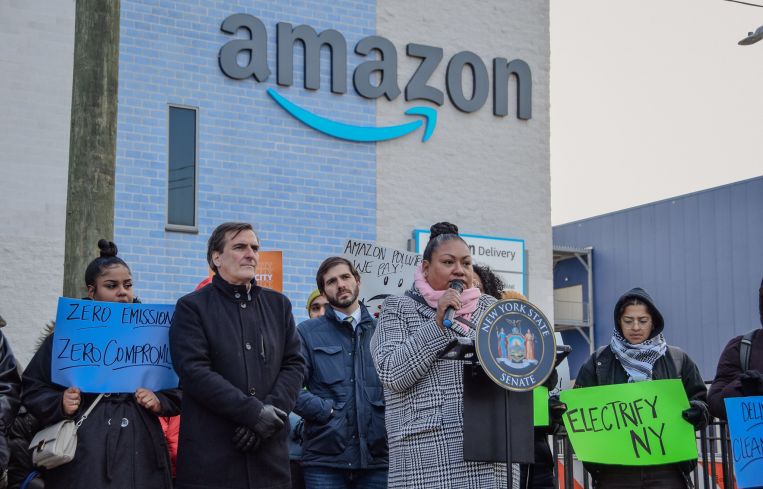New State Bill Aims to Slash E-Commerce Warehouse Emissions and Truck Traffic
By Rebecca Baird-Remba November 29, 2023 6:27 pm
reprints
E-commerce companies may have to dramatically reduce the carbon emissions of their New York warehouses and the truck traffic associated with them under a new bill pushed by two state legislators.
The “Clean Deliveries Act” — sponsored by state Sen. Sen. Michael Gianaris of Queens and Assembly Rep. Marcela Mitaynes of Brooklyn — would require the state Department of Environmental Conservation (DEC) to review the carbon emissions produced by each distribution facility larger than 50,000 square feet or owned by a company that operates 500,000 or more square feet of warehouse space statewide. The bill, which was introduced in the State Senate and the Assembly earlier this year, was recently amended and moved to the environmental conservation committees of both houses.
The DEC would also have to create emission regulations for warehouses and approve specific plans for each property to reduce its carbon footprint. Owners could gain “points” toward their emission goals by cutting the amount of heavy truck traffic coming to and from their warehouses, using electric delivery trucks, installing electric vehicle charging stations, using alternatives like cargo bike delivery or installing solar panels with battery storage systems.
The state would also require “enhanced mitigation measures” for warehouses near schools, day cares, playgrounds, parks, hospitals, senior centers, nursing homes or lower-income communities that have dealt with the environmental impacts of pollution.
Mitaynes said the goal of the bill would be to ease the burden of neighborhoods such as Sunset Park and Red Hook in Brooklyn that have an abundance of last-mile warehouses.
“Our communities experience real worsening effects from these facilities in the form of pollution, posing health risks, safety, as a result of traffic violence, and natural disasters, as we face a future of climate catastrophe,” Mitaynes said in a statement. “And yet, these effects are not recognized because either the trucking emissions are not sufficiently monitored or because regulations to oversee these facilities have not been effectively implemented.”
Residents in Red Hook have long complained about the abundance of trucks flooding the tight streets of the waterfront neighborhood. They recently installed sensors that found its main blocks see nearly 1,000 trucks or vans daily and had air quality measurements classified as harmful to “sensitive groups” for 16 days over a seven-month period, the Guardian reported.
The proposed legislation’s rules would apply to both existing warehouses and future development, including warehouse expansions.
The owner of a warehouse that fell under the legislation’s criteria would have to demonstrate that any new truck traffic generated by the site would not violate federal air quality standards established by the Environmental Protection Agency. Applicants would also be expected to show that their facilities meet LEED Platinum standards for energy efficiency.
Developers would also have to provide information about the truck routes and the number of daily truck trips from their warehouse; conduct a study of traffic, congestion and air quality impacts; and identify nearby communities or facilities that might be impacted by a new warehouse.
Finally, the state would study the possibility of creating zero-emission and low-emission zones, where warehouse operators could only use electric vehicles or would have to meet specific emissions standards with their diesel-powered trucks.
The effort comes after two notable pieces of carbon-reduction legislation from the state and the city. In 2019, the state legislature passed the Climate Leadership and Community Protection Act, which requires New York to reduce its greenhouse gas emissions 40 percent by 2030. The same year, New York City enacted Local Law 97, which requires owners of buildings larger than 25,000 square feet to begin reducing their emissions starting next year.
“We have fought hard to improve our air quality by enacting the nation-leading [Climate Leadership and Community Protection Act], fighting fossil fuel power plants, and pushing for more electrification, but we cannot allow those to be stymied by the proliferation of e-commerce warehouses,” Gianaris said. “We need action now.”
Rebecca Baird-Remba can be reached at rbairdremba@commercialobserver.com.



